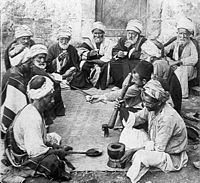
Photo from wikipedia
ABSTRACT Carbon markets are flourishing around the globe, created both by governments and by nonstate actors. In this article, I investigate when and why governments choose to interact with and… Click to show full abstract
ABSTRACT Carbon markets are flourishing around the globe, created both by governments and by nonstate actors. In this article, I investigate when and why governments choose to interact with and use private rules about carbon offsets in public regulatory arrangements. The analysis demonstrates that there is “blurring” between public and private authority, insofar that there are a multiple interactions between the two spheres. However, a closer look reveals that most of these are of a relatively weak nature, since private standards are used for voluntary rather than compliance purposes. To explain this trend, I use qualitative and quantitative analysis and find that NGOs are the main catalysts for the interaction between public and private rules. States are most likely to interact with private regulations when they have large numbers of NGOs active within their borders. In short, private authority is largely a complement to public regulatory arrangements. While previous work that suggests that private authority arises when there are gaps in public rules, the analysis here demonstrates that at the domestic level, this logic does not hold.
Journal Title: International Interactions
Year Published: 2017
Link to full text (if available)
Share on Social Media: Sign Up to like & get
recommendations!